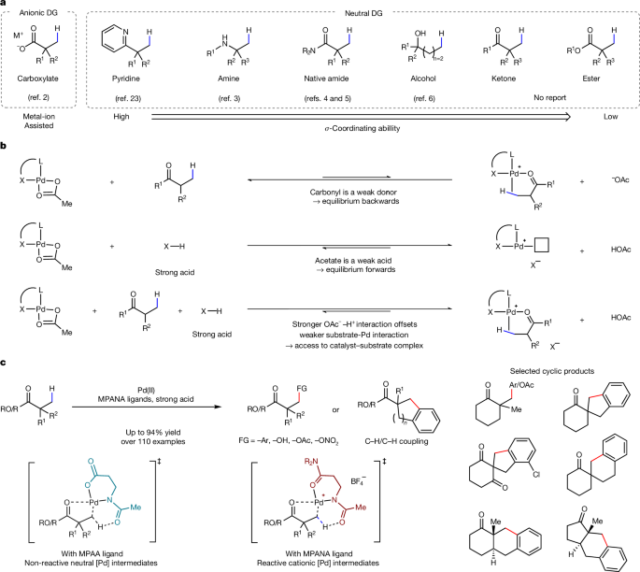Engle, K. M., Wu, H.-C. & Yu, J.-Q. Weak coordination as a powerful means for developing broadly useful C–H functionalization reactions. Acc. Chem. Res. 45, 788–802 (2012).
Google Scholar
Giri, R. et al. Palladium-catalyzed methylation and arylation of sp2 and sp3 C–H bonds in simple carboxylic acids. J. Am. Chem. Soc. 129, 3510–3511 (2007).
Google Scholar
McNally, A., Haffemayer, B., Collins, B. S. L. & Gaunt, M. J. Palladium-catalysed C–H activation of aliphatic amines to give strained nitrogen heterocycles. Nature 510, 129–133 (2014).
Google Scholar
Zhao, R. & Lu, W. Palladium-catalyzed β-arylation of amide via primary sp3 C–H activation. Organometallics 37, 2188–2192 (2018).
Google Scholar
Park, H., Chekshin, N., Shen, P.-X. & Yu, J.-Q. Ligand-enabled, palladium-catalyzed β-C(sp3)–H arylation of Weinreb amides. ACS Catal. 8, 9292–9297 (2018).
Google Scholar
Strassfeld, D. A. et al. Hydrogen-bond-acceptor ligands enable distal C(sp3)–H arylation of free alcohols. Nature 622, 80–86 (2023).
Google Scholar
Mukaiyama, T. Explorations into new reaction chemistry. Angew. Chem. Int. Ed. 43, 5590–5614 (2004).
Google Scholar
Evans, D. A., Vogel, E. & Nelson, J. V. Stereoselective aldol condensations via boron enolates. J. Am. Chem. Soc. 101, 6120–6123 (1979).
Google Scholar
Myers, A. G. et al. Pseudoephedrine as a practical chiral auxiliary for the synthesis of highly enantiomerically enriched carboxylic acids, alcohols, aldehydes, and ketones. J. Am. Chem. Soc. 119, 6496–6511 (1997).
Google Scholar
Constable, A. G., Mcdonald, W. S., Sawkins, L. C. & Shaw, B. L. Palladation of dimethylhydrazones, oximes, and oxime O-allyl ethers: crystal structure of [Pd3(ON = CPriPh)6]. J. Chem. Soc. Chem. Commun. 1978, 1061–1062 (1978).
Google Scholar
Desai, L. V., Hull, K. L. & Sanford, M. S. Palladium-catalyzed oxygenation of unactivated sp3 C−H bonds. J. Am. Chem. Soc. 126, 9542–9543 (2004).
Google Scholar
Thu, H. Y., Yu, W. Y. & Che, C. M. Intermolecular amidation of unactivated sp2 and sp3 C–H bonds via palladium-catalyzed cascade C–H activation/nitrene insertion. J. Am. Chem. Soc. 128, 9048–9049 (2006).
Google Scholar
Zhu, R. Y., Liu, L. Y. & Yu, J. Q. Highly versatile β-C(sp3)-H iodination of ketones using a practical auxiliary. J. Am. Chem. Soc. 139, 12394–12397 (2017).
Google Scholar
Zhu, R.-Y. et al. Versatile alkylation of (hetero)aryl iodides with ketones via β-C(sp3)–H activation. J. Am. Chem. Soc. 139, 16080–16083 (2017).
Google Scholar
Zhang, F.-L., Hong, K., Li, T.-J., Park, H. & Yu, J.-Q. Functionalization of C(sp3)−H bonds using a transient directing group. Science 351, 252–256 (2016).
Google Scholar
Hong, K., Park, H. & Yu, J.-Q. Methylene C(sp3)–H arylation of aliphatic ketones using a transient directing group. ACS Catal. 7, 6938–6941 (2017).
Google Scholar
Pan, L., Yang, K., Li, G. & Ge, H. Palladium-catalyzed site-selective arylation of aliphatic ketones enabled by a transient ligand. Chem. Commun. 54, 2759–2762 (2018).
Google Scholar
Li, Y.-H., Ouyang, Y. X., Chekshin, N. & Yu, J.-Q. Pd-II-catalyzed-C(sp3)–H (hetero) arylation of ketones enabled by transient directing groups. ACS Catal. 12, 10581–10586 (2022).
Google Scholar
St John-Campbell, S., White, A. J. P. & Bull, J. A. Single operation palladium catalysed C(sp3)–H functionalisation of tertiary aldehydes: investigations into transient imine directing groups. Chem. Sci. 8, 4840–4847 (2017).
Google Scholar
Li, Y.-H., Ouyang, Y., Chekshin, N. & Yu, J.-Q. PdII–catalyzed site-selective β- and γ-C(sp3)–H arylation of primary aldehydes controlled by transient directing groups. J. Am. Chem. Soc. 144, 4727–4733 (2022).
Google Scholar
He, J., Wasa, M., Chan, K. S. L., Shao, Q. & Yu, J.-Q. Palladium-catalyzed transformations of alkyl C–H bonds. Chem. Rev. 117, 8754–8786 (2017).
Google Scholar
Liu, B., Romine, A. M., Rubel, C. Z., Engle, K. M. & Shi, B.-F. Transition-metal-catalyzed, coordination-assisted functionalization of nonactivated C(sp3)–H bonds. Chem. Rev. 121, 14957–15074 (2021).
Google Scholar
Shabashov, D. & Daugulis, O. Catalytic coupling of C–H and C–I bonds using pyridine as a directing group. Org. Lett. 7, 3657–3659 (2005).
Google Scholar
Alvarez, S. Coordinating ability of anions, solvents, amino acids, and gases towards alkaline and alkaline-earth elements, transition metals, and lanthanides. Chem. Eur. J. 26, 4350–4377 (2020).
Google Scholar
Christian, L. & Gal, J.-F. Lewis Basicity and Affinity Scales: Data and Measurement (Wiley, 2010).
Wu, Q.-F. et al. Formation of α-chiral centers by asymmetric β-C(sp3)–H arylation, alkenylation, and alkynylation. Science 355, 499–503 (2017).
Google Scholar
Shen, P.-X., Hu, L., Shao, Q., Hong, K. & Yu, J.-Q. Pd(II)-catalyzed enantioselective C(sp3)–H arylation of free carboxylic acids. J. Am. Chem. Soc. 140, 6545–6549 (2018).
Google Scholar
Chen, G. et al. Ligand-accelerated enantioselective methylene C(sp3)–H bond activation. Science 353, 1023–1027 (2016).
Google Scholar
Zhuang, Z. et al. Ligand-enabled β-C(sp3)–H olefination of free carboxylic acids. J. Am. Chem. Soc. 140, 10363–10367 (2018).
Google Scholar
Ng, P. et al. Preparation of 3-spiro-7-hydroxamic acid tetralins as histone deacetylase inhibitors. Patent WO 2016/168660 A1 (2016).
Li, Z. & Yu, J.-Q. Ligand-enabled γ-C(sp3)–H hydroxylation of free amines with aqueous hydrogen peroxide. J. Am. Chem. Soc. 145, 25948–25953 (2023).
Google Scholar






